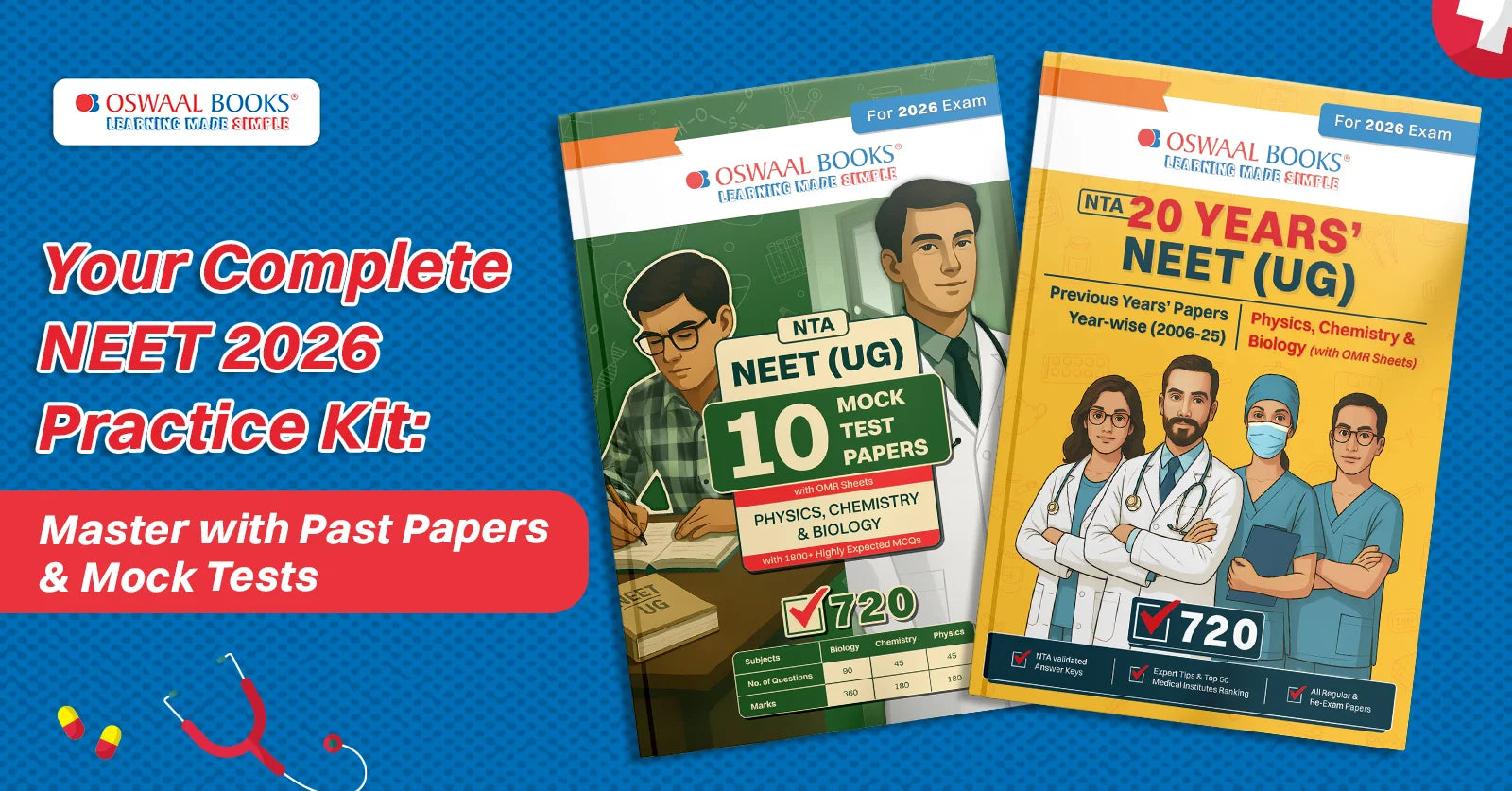Physics tends to be the boss in a video game when it comes to cracking NEET. Whereas Biology has the highest weightage and Chemistry is in the middle, Physics requires accurate concepts, fast calculations, and perfect use of formulas under time pressure. Even toppers confess that Physics can either make or break your NEET rank.
And it is not only knowing the formulas, but also having the concepts down so well that no sneaky question can surprise you. In this blog, we are going to discuss the most challenging topics in Physics in NEET, why students find them challenging, and what they can do to overcome them. We shall also be able to see how tools such as NEET mock test chapter wise practice, and NEET preparation books assist in bridging the gap.
Why is Physics Harder in NEET?
Physics in NEET is not a subject of rote learning, but rather it is a subject of applying logic behind each formula and using it in ways that one would not expect. This is usually hard on the students since:
-
Calculation pressure – Numerical problems require accuracy and speed.
-
Concept interlinking – Topics from different chapters blend into one question.
-
Time constraint – Solving a Physics question often takes longer than Biology or Chemistry.
-
Fear of mathematics – Weak mathematical skills affect Physics problem-solving.
Most Difficult Physics Topics for NEET
|
Rank |
Physics Topic |
Common Reason for Difficulty |
|
1 |
Rotational Motion |
Multiple formulas, tricky concepts of torque and angular momentum |
|
2 |
Electrostatics |
Vector nature of forces, superposition principle |
|
3 |
Ray Optics & Wave Optics |
Conceptual clarity is needed for sign conventions and wave interference |
|
4 |
Electromagnetic Induction |
Faraday’s law application in complex setups |
|
5 |
Thermodynamics |
Confusion between physics and chemistry concepts |
|
6 |
Current Electricity |
Combination of resistances and Kirchhoff’s laws |
|
7 |
Oscillations & SHM |
Phase difference and energy distribution confusion |
|
8 |
Gravitation |
Application of universal law in various conditions |
|
9 |
Modern Physics |
Conceptual depth in the photoelectric effect and atomic structure |
|
10 |
Laws of Motion |
Hidden constraints in pulley and friction problems |
How to Approach These Topics?
The path to mastering tough Physics topics is not about reading them once — it’s about iterative learning:
-
Concept Clarity First – Use visual aids, diagrams, and real-life analogies.
-
Formula Mapping – Create one-page formula sheets for each chapter.
-
Question Variation Practice – Exposure to different patterns reduces surprise.
-
Chapter-Wise Mock Tests – Solving NEET mock test chapter wise ensures targeted improvement.
Read More: NEET 2026 Biology: Most Important Chapters from Class 11 & 12
Which Physics topic is considered the toughest in NEET?
Rotational Motion is one of the most popular topics. Complications come in as we are dealing with torque, angular velocity, and moment of inertia all at once. You must also deal with several formula replacements in a few seconds. The trick is not to memorize blindly but to know the physical meaning of every quantity.
The student who memorizes torque = r x F can forget the directions of the vectors and make a sign mistake. Conversely, a person who imagines torque as a twisting force will automatically use it properly. This knowledge is gained by practice through NEET mock test questions and past year problems.
Why is Electrostatics so confusing for NEET aspirants?
Electrostatics is a mixture of mathematical sophistication and abstract ideas, such as electric fields and potential. Students tend to mix up the sign conventions and have a problem with the vector character of forces. In addition, the superposition principle requires you to imagine a combination of numerous charges.
A good approach to master it is to begin with simple two-charge problems and then go to complicated distributions. Also, when you solve NEET preparation books that elaborate on various ways to solve a problem, it provides you with flexibility in the exam.
How can I improve my score in Physics if I am weak in maths?
Do not panic in case math is your weak point. The same problem was initially faced by many top scorers. This is what works:
• Acquire the mathematical methods in the Physics setting - e.g., learn to differentiate by using problems in velocity and acceleration.
• Check formulas by using unit analysis.
• Gradually improve by solving more NEET mock test problems chapter-wise.
Keep in mind, no matter how good the best book on chemistry for NEET is, it will not help your score in Physics, but confidence in calculations will.
Is Mechanics harder than Modern Physics?
Modern Physics is less conceptually demanding, that is, fewer formulas and more applied. Students, however tend to think it is easy marks and lose precision because of being overconfident.
Whereas Mechanics requires visualization and multi-step problem solving, Modern Physics is concerned with clear conceptual recall. Provided you make a good formula sheet and solve at least three variations of each type in the NEET preparation books, you will be able to do it.
The Mindset Shift You Need for Physics in NEET
Many students approach Physics with a sense of fear, thinking it’s “too hard” or “only for math geniuses.” The truth is, NEET Physics rewards clarity of thought more than raw talent. If you can train yourself to break down a problem into smaller steps, the most difficult-looking questions become surprisingly manageable.
One mindset trick is to treat every Physics problem like a puzzle — not as a test of memory, but as a test of logic. This shift makes practice sessions less stressful and more enjoyable.
Also, remember that your Physics preparation doesn’t exist in isolation. A well-structured timetable where Physics, Chemistry, and Biology complement each other can dramatically boost your overall performance. Even while solving NEET mock test papers, try mixing sections from all three subjects to simulate the real exam environment.
Finally, keep revisiting your weak areas. If a topic like Electrostatics is giving you trouble today, it might just become your strength after 2–3 targeted revision cycles using NEET preparation books and NEET mock test chapter-wise practice.
Your goal isn’t just to “cover the syllabus” — it’s to own it so thoroughly that no NEET Physics question can shake your confidence.
How important is solving previous year questions for mastering Physics?
Solving previous year questions (PYQs) is non-negotiable. NEET has a pattern — certain problem types repeat with slight twists. By working on PYQs:
-
You identify high-weightage areas.
-
You recognize NEET’s preferred question formats.
-
You build speed and accuracy.
Combining PYQs with NEET mock test practice gives the closest simulation to the actual exam.
Strategy to Master Each Difficult Topic
|
Topic |
Key Strategy |
Common Mistakes to Avoid |
|
Rotational Motion |
Practice torque and angular momentum problems with free-body diagrams |
Ignoring sign conventions |
|
Electrostatics |
Start with simple cases and build complexity |
Forgetting the vector nature of force |
|
Ray & Wave Optics |
Draw ray diagrams for every problem |
Skipping sign convention rules |
|
EMI |
Practice induced EMF problems with Lenz’s law visualization |
Mixing up the direction of the induced current |
|
Thermodynamics |
Keep Physics and Chemistry laws separate in notes |
Using Chemistry’s sign convention in Physics |
|
Current Electricity |
Break circuits into simpler sections |
Forgetting to check equivalent resistance units |
|
SHM |
Understand energy distribution between KE and PE |
Confusing phase difference signs |
|
Gravitation |
Visualize forces using diagrams |
Ignoring height/radius ratio effects |
|
Modern Physics |
Memorize the photoelectric equation and nuclear formulas |
Overlooking unit conversions |
Practice comprehensively with Oswaal360 online courses for the NEET exam
Practice Now with Free Oswaal360 Online Mock Test for NEET Exam
Final Thoughts
Physics in NEET is a mental battlefield — but with the right approach, you can turn even the toughest topics into scoring opportunities. The key lies in:
-
Strong conceptual understanding.
-
Consistent NEET mock test practice.
-
Smart revision from NEET preparation books.
-
Chapter-specific focus using NEET mock test chapter-wise strategies.
Whether it’s Rotational Motion or Electrostatics, remember: every topper was once confused too. The difference is that they persisted until clarity came. And that persistence, combined with the right study methods, is what turns a weak subject into your secret weapon.














